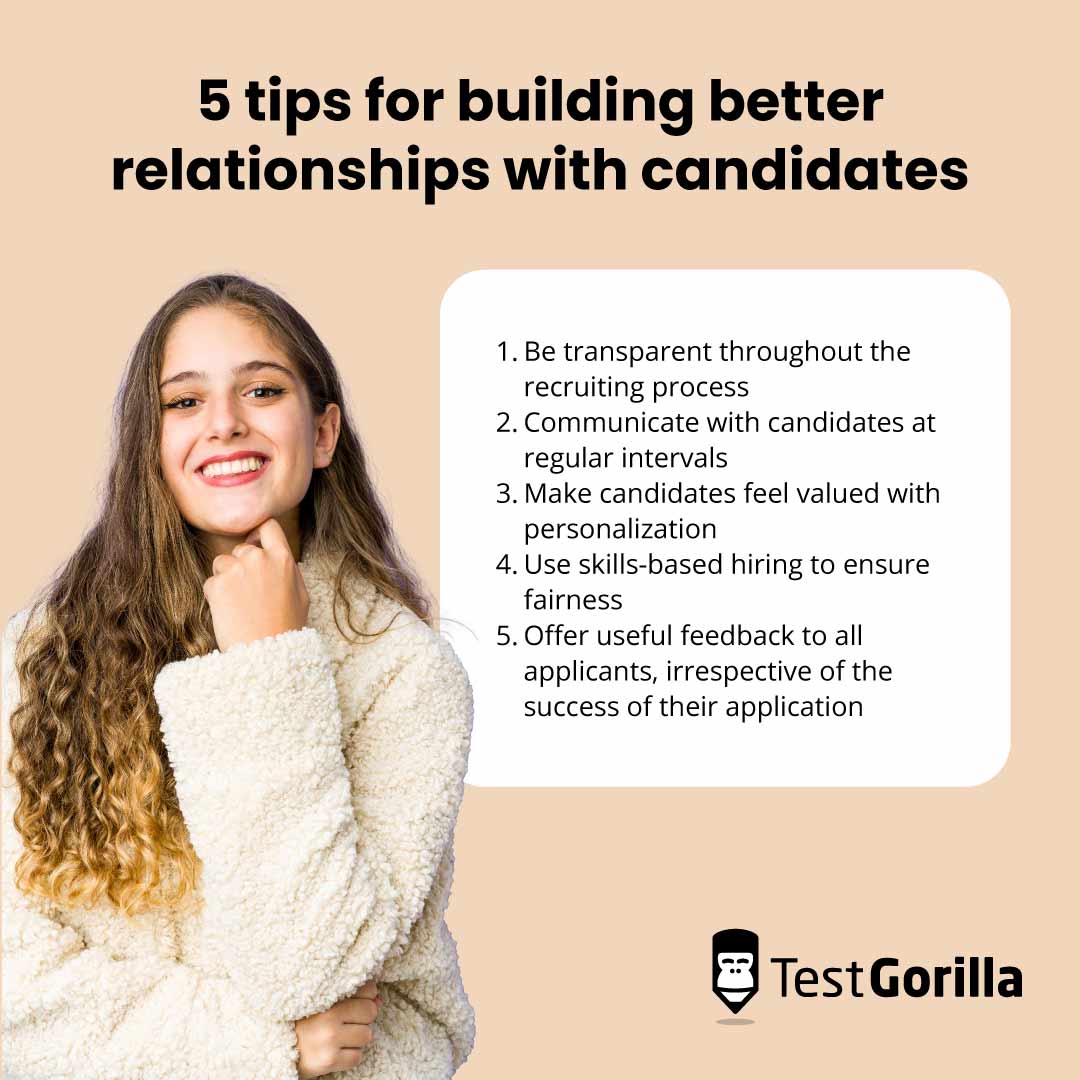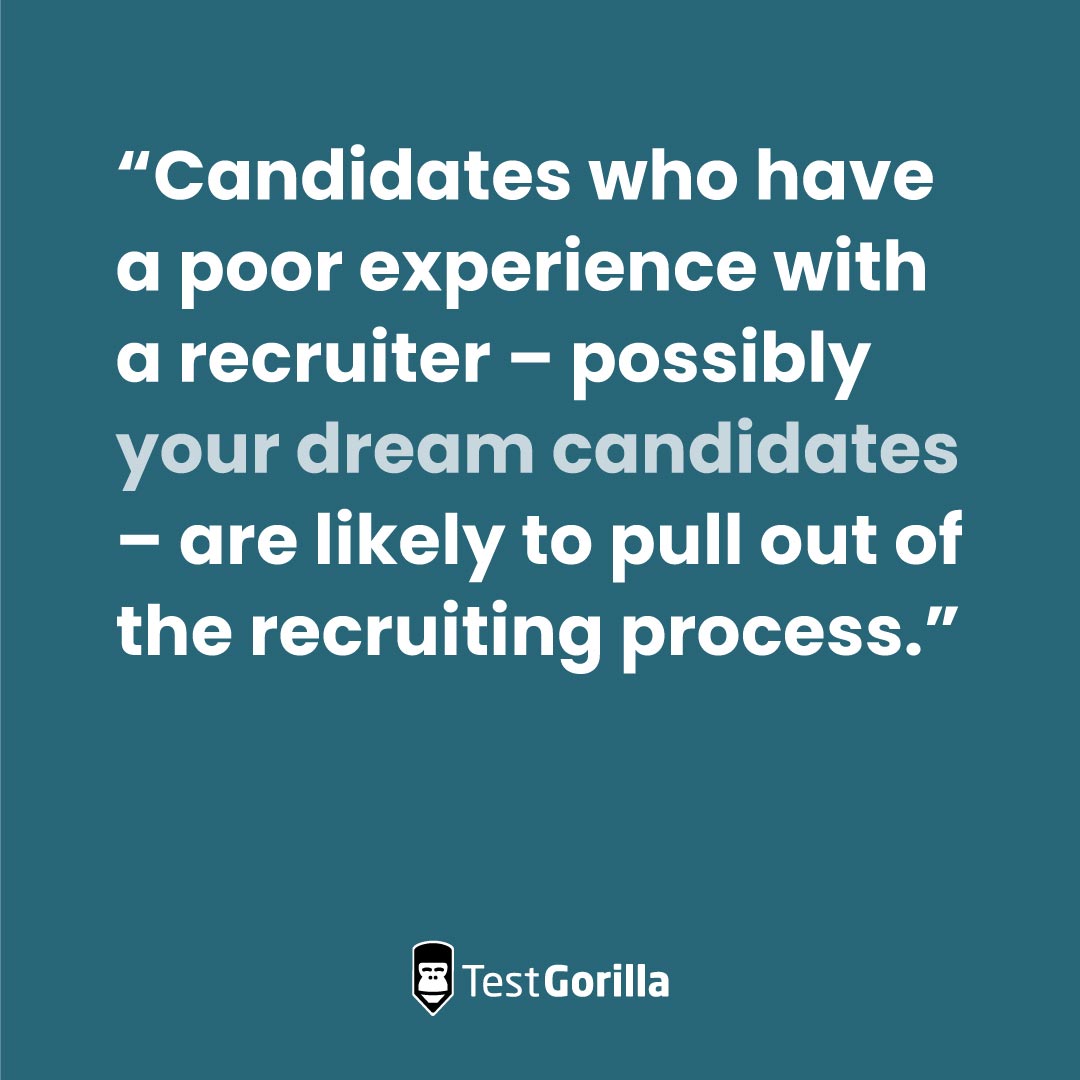CallerSmart, a phone ID company, was looking for a senior developer for its cybersecurity division. After a long skills-testing process, the firm zeroed in on two prospective candidates: James and Sylvia. The company hired Sylvia but kept in touch with James too. The recruiter at CallerSmart helped James get through prospective employers’ front doors, and in turn, James helped the firm hire two new developers from his LinkedIn network.
Building a good candidate relationship is like planting a seed – it may not be useful immediately, but it pays dividends in the years to come.
Good candidate relationships can lead to future hires and new customers. Candidates with a great experience refer other candidates to your company. They may also become customers and refer others to your product or service.
We asked recruiters for their best tips on forging good candidate relationships. Here’s what they had to say.
Table of contents
- 1. Be transparent throughout the recruiting process
- 2. Communicate with candidates at regular intervals
- 3. Make candidates feel valued with personalization
- 4. Use skills-based hiring to ensure fairness
- 5. Offer useful feedback to all applicants, irrespective of the success of their application
- Poor candidate experiences can cost you top talent and revenue
1. Be transparent throughout the recruiting process
According to recruiter Sally Capanzano, transparency in the hiring process builds trust, which is important for a strong candidate relationship. Capanzano suggests being transparent at every stage, “whether it’s letting candidates know if there’s going to be a delay in hearing back from the hiring manager or providing them with helpful feedback around why they’re being rejected.”
Transparency in recruiting starts with your job description. Be honest and clear about responsibilities and perks. One survey found that “not having enough information about job responsibilities” is a top frustration for candidates. To avoid this, list daily and weekly duties clearly.
For instance, for a content writing job, you might list the number of articles writers need to deliver per week or month. Mention any technical or special skills employees need to have or develop on the job so that candidates know what they’re signing up for. You might even consider a skills assessment to give candidates an idea of which skills are needed on the job.
To avoid surprises, explain your recruiting process from the beginning, including the number of interviews and skills tests candidates need to pass.
Other useful pieces of information your candidates are looking for in a job post include salary, ease of commute, location, benefits, and employee reviews.
You should also keep candidates in the loop during the recruitment process and offer valuable feedback to rejected candidates.
2. Communicate with candidates at regular intervals
Candidates say a main point of frustration in their job search comes from companies canceling or postponing interviews and recruiters not responding in a timely manner. It follows that the more regularly you communicate with candidates, the more positively they feel about your company.
As recruiter Peretta Crum says, “Nobody wants to be ghosted…so, never stop communicating with your applicants, even if they are not the right fit for the role you are filling.”
There are several important touchpoints in recruitment communication:
Application status updates: Let candidates know you’ve received their application and are reviewing it.
Skills test updates: Invite candidates to take a skills test and let them know how they performed.
Interview updates: Share your interest in conducting an interview, calendar slots available, interview reminders, and post-interview thank yous.
Timeline and decision-making: Let candidates know how long they need to wait to hear from you and communicate your final decision to them, too, whether it’s an offer or a rejection.
Read more about how to communicate with candidates and get some quick tips on our blog.
3. Make candidates feel valued with personalization
Personalization shows candidates they’re not just a serial number in your pipeline. Also, it’s likely candidates have applied for other jobs, too, so personalization helps your message stand out among generic recruiter emails.
Crum suggests using past experience to craft a personalized email: “What about their profile made you think they were a good fit for the role you are filling? List their specific experience, not just a generic sentence like, ‘your experience is interesting’ or ‘your skill set would be a great asset to our team.’”
Crum also provides an example of how to be specific and personal: “While reviewing your profile I noticed you have an extensive history in manufacturing HR with a great deal of emphasis on hourly employees. The role I would like to explore with you is an HR business partner role that would primarily work with hourly manufacturing employees.”
Another tip from recruiter and sourcer Rachel Saunders is to research candidates on social media and find out about their personal hobbies or passions. You can add a link to a relevant article or video related to their interests in your initial outreach email or even use it as an icebreaker during an interview.
4. Use skills-based hiring to ensure fairness
Using skills tests shows candidates your selection process is based on their competency and not factors like their education, school, prior experience, or even gender, race, and ethnicity. Our State of Skills-Based Hiring survey shows candidates prefer this method of hiring too.
Segun Mustapha, the people and culture officer at Suntory, shared in our survey how skills-based hiring helped him hire more women and remove bias from the company’s hiring process. Other hiring managers also noted that skills-based hiring helped them improve employee retention and reduce overall time-to-hire.
Use skills assessments before conducting interviews to shortlist relevant candidates and save time for both you and the candidate. Assessments can test hard skills like marketing, coding, and accounting, as well as if a candidate reflects the company’s values or culture add.
5. Offer useful feedback to all applicants, irrespective of the success of their application
Helpful application feedback encourages rejected candidates to reapply after developing relevant skills and paves the way for an ongoing relationship. It also shows candidates you value their time.
Pavel Bahu, the global HR head at Trevolution Group, advises, “Ideally, you should give an explanation on why such a decision was taken, and which particular areas should be improved. … you can (also) set the date for re-applying, for example, please inquire again after 6 months.”
Kathryn Boudreau, the operations and project manager at CallerSmart, also suggests guiding candidates on specific courses or certifications that can help them become more relevant in the industry.
This rejection letter from content marketing agency Animalz ticks all the right boxes:
The hiring manager explains what the candidate didn’t do well in their skills assessment project and the ways they can improve their writing skills. The manager also mentions that the candidate could reapply in the future for another relevant role.
All in all, the manager leaves the door open for the candidate to apply again and also positions Animalz as an employer who cares.
Poor candidate experiences can cost you top talent and revenue
Good candidate relationships are helpful, but a bad recruitment experience is costly.
Candidates who have a poor experience with a recruiter – possibly your dream candidates – are likely to pull out of the recruiting process.
Applicants with a sour experience might spread the word among family and friends, too, costing you customers and money. As Virgin Media found out, rejecting candidates without a good explanation cost the company as much as $5m annually.
To build a fair and bias-free recruiting process that candidates enjoy, use skills-based assessments to gauge their proficiency. Then, offer them feedback on how they can improve in case they don’t have the relevant skills.
TestGorilla provides you with skills-based assessments to find the best candidates for a role – a win-win for both of you.
See how it works with our free plan.
Related posts
Hire the best candidates with TestGorilla
Create pre-employment assessments in minutes to screen candidates, save time, and hire the best talent.
Latest posts
The best advice in pre-employment testing, in your inbox.
No spam. Unsubscribe at any time.

Hire the best. No bias. No stress.
Our screening tests identify the best candidates and make your hiring decisions faster, easier, and bias-free.
Free resources
This checklist covers key features you should look for when choosing a skills testing platform
This resource will help you develop an onboarding checklist for new hires.
How to assess your candidates' attention to detail.
Learn how to get human resources certified through HRCI or SHRM.
Learn how you can improve the level of talent at your company.
Learn how CapitalT reduced hiring bias with online skills assessments.
Learn how to make the resume process more efficient and more effective.
Improve your hiring strategy with these 7 critical recruitment metrics.
Learn how Sukhi decreased time spent reviewing resumes by 83%!
Hire more efficiently with these hacks that 99% of recruiters aren't using.
Make a business case for diversity and inclusion initiatives with this data.






















